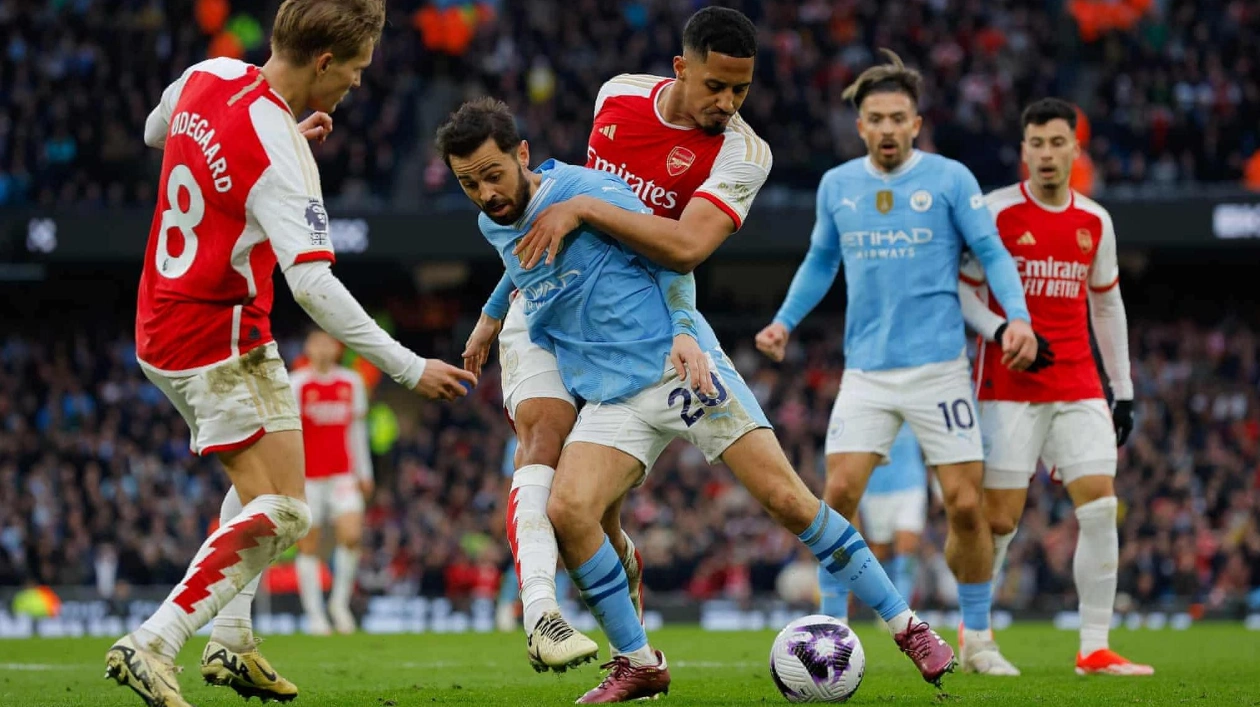Dance while the world burns. English football deserves credit for its endless adaptability. Everything is content. Never stop selling. Even if what you're selling might be the ground beneath your own feet.
Leading up to the big Super Sunday showdown, gambling companies flood inboxes with match-day offers. With Arsenal set to face Manchester City at the Etihad, the gambling emails have been pouring in, this time with a topical twist. As of Wednesday, you can bet on City's financial charges, as if this were just another football match, including HOT MARKETS on deductions, fines, and even relegation (6-1 odds: these people really know their audience).
There's a certain honesty in this. For broadcasters, it's a trickier issue. How to handle this situation, especially when it undermines their upbeat entertainment product? On Sunday, the discussion will revolve around bottling, whether Arsenal were too cautious last season. It will also focus on how the league's best defense deals with Erling Haaland, who has scored 8.5% of all Premier League goals this season.
This is clearly beneficial for everyone, especially the TV audience. The profitability and sustainability rules (PSR) procedure is opaque and unresolved. Nobody comes to sport for this. Can't we just enjoy the analysts discussing the second-phase mid-block counterpress?
As of Monday morning, this issue is finally in the spotlight. A Sunday afternoon meeting with the team City narrowly beat to the league title four months ago, while also being accused of overreaching, adds an ironic twist. Above all, it's a reminder that this is a perilous point in the history of a league formed out of legal squabbles, chicanery, and greed.
Zoom out, and City's charges are arguably the greatest existential threat to the Premier League since its inception. It's time to assess where we stand. The most notable aspect is the sense of two opposing views on how it may play out. City have understandably drawn down the shutters on this topic but are reportedly confident of being vindicated.
There is talk of “irrefutable” evidence proving City’s innocence. One suggestion is that City are supremely confident in their legal resources. Another theory is that certain key pieces of evidence in the public domain, disputed by City, will be inadmissible. The charges fall into five categories: inflated sponsorship income, player and manager remuneration issues, failure to meet Uefa’s financial fair play regulations, breaches of PSR, and allegations of bad faith.
The evidence, disputed by City, is most compelling on the key front of sponsor income. Uefa’s financial rules have always been the enemy of City’s owners. There is alleged talk of “creative solutions” to get around the rules and the launch of “Project Longbow.” The alleged narrative is that City’s sponsors were not real commercial parties but compliant bodies covertly routing money from the ownership.
There will be those who say this is all beside the point, that the rules should not exist. This argument works only if you have little understanding of what a market actually is. State subsidies, inflated value, Neymar being sold for €220m to the state of Qatar, a politically motivated ownership pumping in excess funds to serve its propaganda purposes. None of these things suggest a functioning free market. This is the opposite: state intervention, a market distortion, the command economy.
While this may seem obscure and procedural, it is utterly key to what happens on the pitch and central to everything City have built. This success can be plotted almost exactly against the flow of money out. Over the period the main charges relate to, 2009-18, City’s net spend on transfers was about £900m, almost £400m more than Manchester United, and five times as much as Liverpool and Arsenal.
By the time City’s seminal title arrived in May 2012, leaked internal calculations suggest that £127.5m had been pumped in as “supplements” to their Abu Dhabi partnership deals. More recently, Guardiola’s team have won the league on the final day or by a point three times while, it is alleged and denied, enjoying the benefits of breaking rules their immediate opponents obeyed.
The fact remains City have yet to suffer significant punishment. In the more recent Uefa case, key elements of evidence were found to be time-barred. Deals have been made with no less a figure of unquestioned rectitude than Gianni Infantino. The problem facing City, and indeed the Premier League, is that their current accusers are not Uefa but a collective of other clubs with their own competing desires for success, glory, and profit.
It's hard to see any outcome that genuinely benefits the Premier League. Three things can happen from this point. First, City are found guilty and punished to a significant degree. This would represent a potential disaster for the Premier League. The second outcome is City are found to be innocent. This would also be disastrous for the Premier League.
The third, and by far most likely, outcome is a qualified compromise, acceptance of some things, dismissal of others, and punishment that allows everyone to live with the outcome. The panel is, of course, entirely independent and concerned only with the truth. On the other hand, football, for all its self-importance, remains a very small player. Manchester City are an arm of an influential nation state with whom the UK did £25bn of trade in the previous financial year.
So, back to the game. With hindsight, Arsenal probably missed a chance to seize the initiative at the Etihad last season. It still seems likely Mikel Arteta will look for something similar this weekend. Keep it tight. Mummify Haaland in between those two highly impressive centre-halves. Look to counterpunch a set-piece goal along the way. This is likely to be the template on Tribunal Day Seven in Manchester, with the low-scoring draw, the exhaustingly complex 1-0 still the most likely outcomes.






